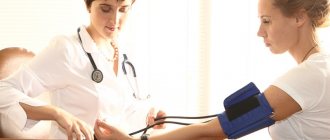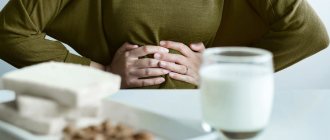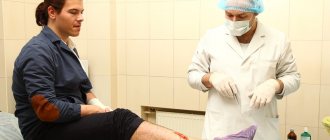Diarrhea (diarrhea) is one of the main reasons for adults to visit a doctor. Diarrhea refers to all cases of frequent (more than 3 times a day) bowel movements with the release of liquid, unformed feces. If symptoms last no more than 14 days, such diarrhea is considered acute, and malaise for more than 4 weeks is equivalent to chronic diarrhea. Every year in Russia, about 800 thousand cases of acute diarrhea due to intestinal infections are registered, and chronic diarrhea occurs on average in 7-14% of the adult population.
Different types of diarrhea and their differences
Doctors distinguish 4 types of diarrhea, and they differ not only in the mechanism of development, but also in the appearance of the stool:
- Secretory. It occurs when excess water and salts enter the intestinal lumen under the influence of bacterial toxins, disturbances in the hormonal regulation of digestion, and excessive use of laxatives. Manifested by copious watery stools without or with a small amount of impurities.
- Osmotic. It is observed with slow absorption of water, electrolytes and carbohydrates from the intestine due to insufficiency of digestive enzymes, deficiency of bile acids, anatomical and functional defects of the gastrointestinal tract. It manifests itself as copious loose stools with a fetid odor, often accompanied by steatorrhea - “fatty” feces.
- Exudative. It develops when the intestinal wall is damaged by the inflammatory process during certain intestinal infections (dysentery, salmonellosis), Crohn's disease, and ulcerative colitis. In this case, the stool will be liquid or pasty, scanty, with an abundance of mucus and blood.
- Motor. It occurs as a result of accelerated peristalsis due to impaired nervous regulation (irritable bowel syndrome), excessive secretion of hormones, and taking certain medications. During defecation, a moderate amount of liquid feces without pathological impurities is released.
What is diarrhea?
Diarrhea in adults and children over the age of 1 is called partial (three times per dose or more) rare stelec. In people who are unable to empty their bowels, it may take longer to empty their bowels, so their passage is characterized by an increased frequency of movement and a change in its consistency (wateriness).
In adults, diarrhea is often accompanied by one or more severe symptoms:
- cramps and pain in the abdomen - arise due to the presence of grub or carry-over, caused by microbes;
- blood or mucus in feces;
- boredom, vomiting - this is how the body gets rid of toxins, which are seen as pathogenic microorganisms that are lost in the intestines;
- A container with a rotten smell should be avoided when carried in due to the lack of herbal enzymes;
- watering - due to the inflamed intestinal walls caused by infection, the stench cannot effectively remove water;
- Increased body temperature during transportation often speaks about its infectious nature or food poisoning.
Due to fatigue, diarrhea occurs:
- Gostroy - takes 1-2 days and goes away on its own. It occurs more frequently than other species;
- I will prepare - it will take two to four years;
- chronic - it’s troubling no less than a few years ago. Symptoms of chronic bowel movement may disappear for an hour, and then appear again.
Prolonged diarrhea without adequate therapy may be unsafe due to its complications - diarrhea and impaired absorption of living fluids. This occurs through the proliferation of pathogenic microorganisms in the intestines. The stench smells of toxins, which indicate irritation and burning of the walls. As a result, the absorption of water and living fluids is disrupted, and the body cannot function normally.
The main symptoms of anemia in adults include:
- almost there;
- dryness of mucous membranes;
- prishvidshene sertsebittya;
- headache;
- confused, unpretentious;
- dry mouth, sprague;
- Reduced frequency of Sechovipuskan.
Symptoms of fever in children:
- headache;
- vtoma;
- drowsiness;
- I cry a lot of tears every hour;
- decreased frequency of Sechovipuskan;
- dry skin;
- graciousness;
- sunken eyes and fontanel.
First aid measures for diarrhea
If you experience diarrhea or other signs of gastrointestinal distress, do not delay seeing a doctor. The specialist will quickly make the correct diagnosis and prescribe treatment. However, before the doctor arrives, you can alleviate your condition:
● drink more fluids (water, dried fruit compotes, strong tea) to prevent dehydration
● give up heavy fatty foods, flour, sweets, spices and herbs, fresh vegetables and fruits
● eat more starchy soft foods - porridge, stewed vegetables, mashed potatoes, unsweetened baked goods made from premium flour
● drink enterosorbents (Sorbex, Enterosgel, Polysorb, Laktofiltrum)
How can you carry it through?
Diarrhea is a sign of problems in the body, so first of all, you need to understand the reason for your guilt. Diarrhea can be called:
- Viral infections (cytomegalovirus, viral hepatitis, rotavirus and others). Coronavirus infection (COVID-19) can also cause diarrhea, which is often accompanied by nausea and vomiting;
- bacterial and parasitic infections (coliform, amoebiasis and others). Water and hedgehogs are contaminated with pathogenic microorganisms, and your hands are also numb. “Diarrhea of mandrivniks” is also to blame for these reasons. In countries with a hot and humid climate, water microbes multiply especially quickly, so drinking tap water, uneaten vegetables and fruits, or badly fried meat can cause intestinal disorder;
- taking certain medications. Antibiotics are often the cause of carry-over, since the stink is caused not only by pathogenic microorganisms, but also by the intestinal microflora - probiotics, thereby disrupting the natural balance. Diarrhea can also be caused by cancer treatment drugs and antacids that contain magnesium (medicines that reduce the acidity of the slug juice). When taken above-average, they enhance the intestinal function - water does not penetrate into its walls, and diarrhea develops;
- lactose intolerance - zukru, which is found in milk and other dairy products. People who suffer from lactose intolerance suffer from dairy products. With the age of grub, intolerance increases, as the number of enzymes that break down the milk zukor changes;
- intolerance to fructose - a natural sugar that can be found in fruits, honey, and also prepared foods such as malt syrup (may be labeled as high-fructose corn syrup);
- Gluten intolerance is a protein found in wheat, barley and grains. This illness is called celiac disease or celiac enteropathy;
- There is a wide range of products that replace artificial sugar substitutes - sorbitol, mannitol and xylitol. They are added to chewing gum and ice cubes without cucumber;
- surgery was performed on the abdominal organs - appendix, gallbladder, thoracic intestine, liver, subslantum, small intestine, spleen or vulva;
- Other problems of etching. Chronic bowel movement can be caused by Crohn's disease, virulent colitis and leaky bowel syndrome.
When to call an ambulance
Diarrhea can be severe or be the first sign of serious gastroenterological or surgical pathology. To avoid complications, the patient is advised to seek emergency care.
Signs of deterioration:
● repeated vomiting that does not bring relief
● frequent and copious stools, accompanied by dehydration
● an increase in temperature over 39°C and no effect from standard antipyretic tablets
● the appearance of blood or pus in the stool
● impaired consciousness
Why can there be vomiting and diarrhea?
Vomiting and diarrhea may be signs of viral gastroenteritis - an intestinal infection. You can become infected with it from wind-spotted or butchery soil (some of the virus lives on surfaces for a long time), as well as through contaminated water or food products. Illness is characterized by occasional watery stool, nausea, vomiting, pain and cramps in the abdomen, and in some episodes - fever. In a healthy person, viral gastroenteritis is not difficult and goes away quickly, but for the elderly and elderly people it can be fatally dangerous.
There is no specific treatment for viral gastroenteritis, so it is important to prevent the development of illness. For this purpose, you need to wash your hands frequently and do not ingest water or food that may be contaminated.
Symptomatic therapy
Diet correction is required. In case of an acute disorder, a starvation diet is indicated with the gradual introduction of rice dishes, products containing pectins, salted soups, broths, dietary protein foods (veal, turkey, chicken, hard-boiled eggs). Diarrhea with water causes a significant amount of fluid to be lost, so if the patient's condition is satisfactory, it is important to ensure that the patient drinks plenty of fluids to prevent severe dehydration.
Until the exact cause of stool disorders is determined, adsorbents, astringents and enveloping agents are used to reduce the frequency of watery diarrhea. Under no circumstances should you take medications that inhibit intestinal motility, as this can increase intoxication and lead to a deterioration in the patient’s condition. Antibacterial agents and antidiarrheal drugs are selected only by a doctor, taking into account the results of the examination and the sensitivity of pathogenic microorganisms.
Active ingredient: Rifaximin
Trade name of the drug:
- Alpha Normix (Alfa-Wasserman, Solvay Pharma)
Features of the drug that are important for the patient to know about
A modern antibiotic that acts on almost all bacteria that cause gastrointestinal infections, including traveler's diarrhea. When taken, nausea, vomiting, discomfort and abdominal pain are possible, which usually go away on their own and do not require changing the dose or discontinuing treatment.
Active ingredient: Colloidal silicon dioxide
Trade name of the drug:
- Enterosgel (Silma)
Features of the drug that are important for the patient to know about
A powerful drug with pronounced sorption and detoxification properties. The action is similar to Polysorb. Does not reduce the absorption of vitamins and microelements, promotes the restoration of impaired intestinal microflora and does not affect its motor function. May cause nausea and constipation. Contraindicated in intestinal atony.
Advantages of cooperation with our network of clinics
The IMMA network of medical clinics offers extremely high European standards of private medicine at affordable prices.
Among our main competitive advantages are:
- An impeccable market reputation and reviews from satisfied customers;
- A huge staff of experienced qualified doctors;
- Progressive treatment methods;
- Availability of imported effective drugs and diagnostic equipment;
- Free consultations on any questions before making an appointment;
- Possibility of providing one-time treatment or examination or concluding an agreement for ongoing medical care at a more affordable price;
- Transparent pricing policy and affordable fixed prices for the entire range of services;
- Availability of a unified information and analytical system;
- Availability of 6 medical and outpatient facilities in different areas of the city;
- Providing assistance at home;
Help desk service available 24/7.
Active ingredient: Activated carbon
Trade name of the drug:
- Carbopect (Medisorb)
- Activated carbon (various manufacturers)
- Ultra-adsorb (Lainco)
Features of the drug that are important for the patient to know about
One of the most famous sorbents. Reduces the absorption of toxic substances and heavy metal salts from the gastrointestinal tract, promoting their removal from the body. Adsorbs gases on its surface. When used, both constipation and diarrhea and black stool staining are possible. Contraindicated for ulcerative lesions of the gastrointestinal tract, gastric and intestinal bleeding. Ultra-adsorb has a powder form and has increased porosity, which significantly increases the adsorbing surface of the carbon and eliminates the irritating effect on the intestinal walls.
Causes of diarrhea in children
Diarrhea occurs much more often in children than in adults. Mostly, the cry is “sickness of the chest hands”, since children’s skills in maintaining special hygiene are still weakly developed. Other common causes of diarrhea in children include:
- infections: viral (rotavirus), bacterial (salmonella), and sometimes parasitic (giardiasis);
- taking antibiotics and carrier drugs;
- food outlet;
- chronic diseases of the herbal tract: leaky bowel syndrome, Crohn's disease, virulent colitis;
- grub intolerance to gluten, lactose, fructose.
How to treat diarrhea?
Carrying through, especially strong, can quickly lead to dehydration of the body and loss of self-esteem, so you need to start rejoicing immediately. The basic principles of diarrhea therapy are:
- Susunennya reason why she screamed the passage. Since it is often the result of a bacterial infection, antimicrobial agents, for example, drugs of the nitrofuran series, stagnate. The stench is effective against most causative intestinal infections and does not penetrate into the blood. The dosing regimen of the medicine is determined by the doctor;
- purposes of rehydration therapy. Since, during severe obesity, a person consumes a lot of minerals with water at once, their deficiency needs to be replenished. The pharmacy sells products for renewing the water-electrolyte balance in the form of powders that need to be diluted with water. Ready-made wine should be drunk in small pieces after a skin episode of rare milk;
- Until the end of a special diet, which reduces bowel movements. The hedgehog should be soft, lean, pureed and with a low content of grub fibers - preference should be given to lean meat, bananas, rice porridge in water, bread with refined white flour and puree. fresh apples;
- use of prebiotics, which renew the intestinal microflora. Prescribed after a course of antibiotics.
Active ingredient: Hydrolytic lignin
Trade name of the drug:
- Polyphepan (Syntek)
- Filtrum-sti (Avva Rus)
- Entegnin (dietary supplement) (Bioton)
Features of the drug that are important for the patient to know about
Classic enterosorbent with high efficiency. Binds and removes pathogenic bacteria and their toxins, medications, poisons, heavy metal salts, alcohol, allergens, bilirubin, cholesterol, urea and other substances from the body. It is non-toxic, not absorbed and is completely eliminated from the intestines within 24 hours. In rare cases, it may cause allergic reactions and constipation. It is undesirable to use the drug during exacerbation of gastric and duodenal ulcers, intestinal atony, and anacid gastritis.
An indecent disease. How doctors themselves treat diarrhea Read more
Survey
Watery diarrhea always indicates problems with the digestive system. A gastroenterologist or infectious disease specialist examines patients with complaints of watery diarrhea. To verify the clinical diagnosis, a comprehensive examination of the gastrointestinal tract is necessary using laboratory and instrumental methods to detect morphological changes and establish the cause of diarrhea. The most valuable in diagnostic terms are:
- Radiography
. Using plain radiography of the abdominal cavity, the condition of the patient's gastrointestinal tract is quickly assessed. For a detailed study of the inner surface of the digestive tract, oral contrast with barium sulfate is used. The method is quite informative in detecting non-infectious processes that cause watery stools. - Ultrasonography
. A non-invasive examination method is used as a screening diagnosis to exclude severe organic diseases of the digestive system and neoplasms. An abdominal ultrasound can reveal signs of an inflammatory process. Sonography is also performed to assess the condition of the pancreas. - Stool analysis
. To study the processes of digestion and absorption of food, a microscopic examination of feces is carried out with pH measurements. Watery diarrhea is often caused by infectious processes, so all patients undergo bacteriological culture of stool and analysis for helminth eggs. To exclude ulcerative destructive processes, the Gregersen reaction is indicated. - Serological reactions
. Searching for antimicrobial antibodies or specific antigens in the blood is the most accurate way to determine various infectious diseases, especially viral ones. The study may not be sufficiently informative in the first few days from the onset of the disease, when the concentration of antibodies in the blood has not yet increased.
As an additional general clinical method, a biochemical blood test is used to help determine the degree of malabsorption and protein deficiency. If specific lesions of the gastrointestinal tract wall are suspected, endoscopic examination with biopsy is recommended. To assess the exocrine function of the pancreas, a blood test for amylase and lipase is sometimes prescribed.
Adsorbents are used to reduce the frequency of watery diarrhea
Gentle mode
With diarrhea, it is necessary to provide the patient’s body with energy, but this must be done carefully. Preference should be given to easily digestible foods: boiled, steamed and then pureed. Steamed cutlets, quenelles, soufflés made from tender lean meat or fish are the best source of protein. Slimy cereal soups with low-fat light broth are recommended. Porridges made from rice, oatmeal, or buckwheat must be wiped before use.
Allowed are soft-boiled eggs or in the form of a steamed omelet, fresh unleavened cottage cheese, pureed baked apples, jelly made from fruits and berries that have a fixing effect (pear, blueberry, dogwood, quince). The only fat allowed is butter – it can be added little by little to prepared dishes.
For diarrhea, it is useful to eat yesterday's wheat bread and wheat crackers - they have adsorbent properties. Other baked goods are excluded.
On a note
Proper nutrition is especially important for treating diarrhea. Viscous soups are recommended - rice or oatmeal (you can add a little butter to them). You can eat liquid porridges: semolina, rice, grated buckwheat and oatmeal. Dishes are prepared from lean meats, poultry and fish, which are passed through a meat grinder 2-3 times or broken up in a blender.
Excluded from the diet: black bread, legumes, beets, cucumbers, sauerkraut, radishes, plums, grapes, fruit juices, whole milk, cream, yoghurts, fermented baked milk, fatty meats, fish, poultry, meat and fish broths, sauces , spices, alcohol.
Complete fasting in case of stool disorder is not advisable.










